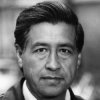Cesar Chavez

Cesar Chavez
Cesar Chavezwas an American labor leader and civil rights activist who, with Dolores Huerta, co-founded the National Farm Workers Associationin 1962. Originally a Mexican American farm worker, Chavez became the best known Latino American civil rights activist, and was strongly promoted by the American labor movement, which was eager to enroll Hispanic members. His public-relations approach to unionism and aggressive but nonviolent tactics made the farm workers' struggle a moral cause with nationwide support. By the late 1970s, his tactics...
NationalityAmerican
ProfessionCivil Rights Leader
Date of Birth31 March 1927
CityYuma, AZ
CountryUnited States of America
The strike and the boycott, they have cost us much. What they have not paid us in wages, better working conditions, and new contracts, they have paid us in self-respect and human dignity.
When you have people together who believe in something very strongly - whether it's religion or politics or unions - things happen.
In this world it is possible to achieve great material wealth, to live an opulent life. But a life built upon those things alone leaves a shallow legacy. In the end, we will be judged by other standards.
Because we have suffered, and we are not afraid to suffer in order to survive, we are ready to give up everything - even our lives - in our struggle for justice.
The name of the game is to talk to people. If you don't talk to people, you can't get started...You knock on twenty doors or so, and twenty guys tell you to go to hell, or that they haven't got time. But maybe at the fortieth or sixtieth house you find the one guy who is all you need. You're not going to organize everything; you're just going to get it started.
Self dedication is a spiritual experience.
We know we cannot be kind to animals until we stop exploiting them -- exploiting animals in the name of science, exploiting animals in the name of sport, exploiting animals in the name of fashion, and yes, exploiting animals in the name of food.
The road to social justice for the farm worker is the road of unionization. Our cause, our strike against table grapes and our international boycott are all founded upon our deep conviction that the form of collective self-help, which is unionization, holds far more hope for the farm worker than any other single approach, whether public or private. This conviction is what brings spirit, high hope and optimism to everything we do.
We know what unions have done for other people. We have seen it and we have studied and we have cherished the idea of unionism. We have seen the history and development of unions in this country and we tell the growers that we want nothing more, but that we want our own union and we are going to fight for it as long as it takes.
The poor, you know, have a way of solving problems...they have a tremendous capacity for suffering. And so when you build a vehicle to get something done, as we've done here in the strike and the boycott, then they continue to suffer - and maybe a little bit more - but the suffering becomes less important because they see a chance of progress; sometimes progress itself. They've been suffering all their live.s It's a question of suffering with some kind of hope now. That's better than suffering with no hope at all.
The thing that we have going for us is that people are willing to sacrifice themselves.
We are suffering. We have suffered. And we are not afraid to suffer in order to win our cause.
It is my deepest belief that only by giving our lives do we find life.
Across the San Joaquin valley, across California, across the entire nation, wherever there are injustices against men and women and children who work in the fields - there you will see our flags - with the black eagle with the white and red background, flying. Our movement is spreading like flames across a dry plain.